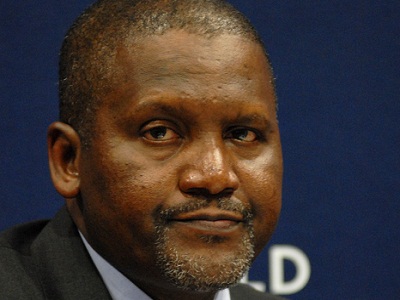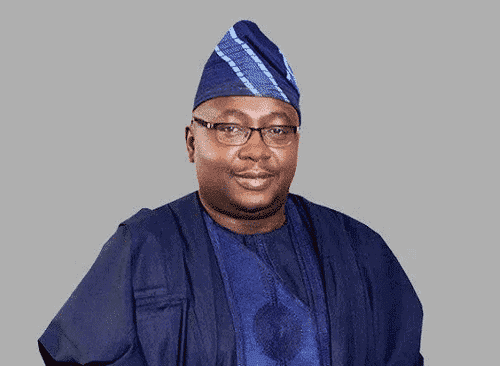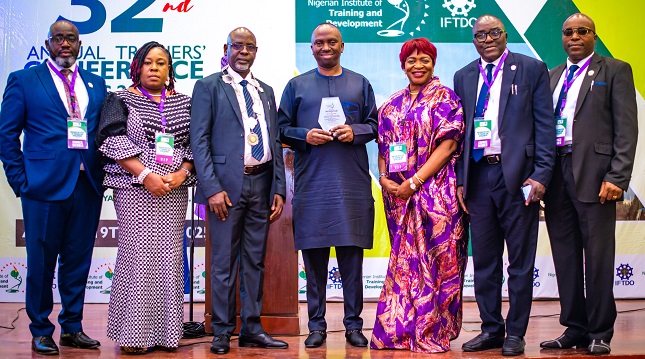News
Dangote Made $9.2Bn in 2013, Bill Gates is World’s Richest

Aliko Dangote, Africa’s richest person and founder of Dangote Group, one of the continent’s largest conglomerates, added $9.2 billion during the year.
He’s the 30th-richest person in the world. His fortune is now well over $30billion.
Bloomberg’s billionaire’s index showed that the 300 richest people in the world increased their deep pockets with $524 billion.
But Bill Gates , the man who is the most generous giver on earth, is also the richest individual, according to the Bloomberg report.
Gates net worth ballooned by $15.8 billion to $78.5 billion, according to the index, as shares of Microsoft, the world’s largest software maker, rose 40 percent in 2013.
Bloomberg said that the 58 year-old software tycoon recaptured the title of world’s richest person on May 16 from Mexican investor Carlos Slim.
Gates’s fortune has also benefited from a rally in stock holdings that include the Canadian National Railway Co. and sanitizing-products maker Ecolab Inc., which rose 34 percent and 45 percent respectively.
Gate’s increasing wealth is typical of the experience of the world’s richest in 2013. Bloomberg says the world’s richest even got richer, in a trend that will further sadden the world’s poorest as the rich take everything away.
“The aggregate net worth of the world’s top billionaires stood at $3.7 trillion at the market close on Dec. 31, according to the ranking. The biggest gains came in the technology industry, which soared 28 percent during the year. Of the 300 people who appeared on the final ranking of 2013, only 70 registered a net loss for the 12-month period.
“The rich will keep getting richer in 2014,” John Catsimatidis, the billionaire founder of real estate and energy conglomerate Red Apple Group Inc., said in a telephone interview from his New York office. “Interest rates will remain low, equity markets will keep rising, and the economy will grow at less than 2 percent.”
Most of Gates’s assets are held in Cascade Investment LLC, an entity through which he owns stakes in about three dozen publicly traded companies and several closely held businesses, including Four Seasons Hotels and Resorts and Corbis Corp., a photo-archive company. Less than a quarter of Gates’s fortune is held in Microsoft. He’s donated $28 billion to the Bill & Melinda Gates Foundation.
Global stocks soared in 2013 for the best annual gain since 2009, with the MSCI World Index advancing 24 percent during the year to close at 1,661.07 on Dec. 31.
The Standard and Poor’s 500 Index rose 30 percent to close at 1,848.36, its best yearly gain since 1997. The Stoxx Europe 600 gained 17 percent to close at 328.26.
Companies in the S&P 500 are worth $3.7 trillion more today than they were 12 months ago following a year when Federal Reserve Chairman Ben S. Bernanke signaled the curtailment of economic stimulus.
The bull market, born at the depths of the credit crisis, enters its sixth year fueled by near-zero interest rates and conviction among investors that it’s finally safe to own equities again.
News
Nigeria Taps $190M JICA Loan to Power Underserved Communities

Nigeria is seeking a $190 million renewable energy loan backed by the Japan International Cooperation Agency (JICA), according to Adebayo Adelabu, minister of power.

Minister Adebayo-Adelabu
In a statement released by the ministry on Saturday, Adelabu disclosed the plan during the 9th Tokyo International Conference on African Development (TICAD 9) in Yokohama, Japan, where the Nigerian delegation led by President Bola Tinubu held high-level discussions on power, infrastructure, and industrial transformation.
Adelabu said the facility is aimed at scaling distributed renewable energy solutions across underserved communities. “This builds on the recently launched $750 million World Bank Distributed Access through Renewable Energy Scale-up (DARES) programme under the Mission 300 Compact, which aims to bring clean and reliable electricity to more than 17 million Nigerians,” the ministry said.
The minister also held talks with Japanese corporations including Toshiba, Hitachi, Japan’s transmission and distribution corporation, and energy exchange corporations. Discussions focused on strengthening transmission infrastructure, improving operational efficiency, and cutting system losses.
The ministry said these engagements build on recent Federal Executive Council approvals for counterpart funding of N19.08 billion to unlock a $238 million loan from JICA. The loan will finance the expansion of the national grid, including the construction of over 200km of new 330kV and 132kV double circuit lines, six new substations, and extensions to existing facilities.
Three substations funded through a $32 million JICA grant—located in Apo (FCT), Keffi (Nasarawa), and Apapa (Lagos)—are also set for commissioning, a move expected to boost supply reliability for households, industries, and business hubs, including the Lagos Port.
Speaking during a panel session themed “HICKARE Africa: Harnessing Innovation, Co-creation, and Knowledge for Accessible and Resilient Energy for Africa”, Adelabu highlighted Nigeria’s energy gap, noting that only 55–60 percent of the population currently has access to electricity, much of which is unreliable.
He outlined the government’s approach to expand grid access in urban areas while accelerating off-grid solutions such as solar mini-grids and standalone systems in rural and peri-urban communities. He pointed to challenges including limited access to affordable capital, high costs for rural households, and the under-utilisation of productive-use equipment.
Despite these hurdles, the minister reaffirmed the government’s commitment to reforms through supportive policies, private-sector collaboration, and increased local manufacturing of renewable energy components.
Adelabu commended JICA and the Japanese government for their “long-standing support” to Nigeria’s power sector, praising their contributions to infrastructure, training, technical studies, and financing. He expressed optimism for deeper partnerships between both countries in driving Nigeria’s energy transition.
News
Banigbe, T2 CEO says Nigeria’s Growth Hinges on Learning, Innovation, and Afrocentric Content

Obafemi Banigbe, chief executive officer of T2, has stressed that Nigeria’s long-term economic transformation depends on continuous upskilling, digital learning, and workforce adaptability.

Speaking as Special Guest at the 32nd Annual Trainers’ Conference (ATC 2025) of the Nigerian Institute of Training and Development (NITAD), held recently at the Shehu Musa Yar’Adua Centre, Abuja, Banigbe warned that without deliberate investment in human capital and technology-driven innovation, the nation risks lagging behind in a rapidly evolving global economy.
Drawing from personal reflections, practical insights, and a forward-looking vision, Banigbe urged Nigerians to reimagine approaches to learning, work, and growth in order to build a prosperous, inclusive, and innovation-led society.
He emphasized that the traditional model of “learning once and working forever” is obsolete.
“With Nigeria projected to become the world’s third most populous nation by 2050, and 70 percent of its citizens under 30, the need for continuous upskilling, digital learning, and adaptability is not optional, it is existential,” he stated.
Banigbe underscored the importance of democratizing access to digital tools, ensuring that every Nigerian child has the same opportunities as peers in developed economies.
He called for the creation of Afrocentric educational content, including culturally relevant cartoons, to help children learn science, mathematics, and history through familiar cultural references rather than foreign identities that disconnect them from their environment.
He also urged a national shift away from a culture that prizes certificates and training hours to one that rewards competence, innovation, and problem-solving.
He envisioned a civil service and workforce driven by solutions rather than processes, stressing that while artificial intelligence may analyze and automate, it cannot dream, uphold ethics, or create new nations, a reminder of the enduring human advantage.
Banigbe further encouraged adoption of cost-effective training models such as online platforms, virtual cohorts, and open-source learning, while acknowledging the continued value of global exposure where local resources fall short.
During an interactive question and answer session, he addressed concerns around affordability, accessibility, and the role of self-driven digital education in shaping Nigeria’s future-ready workforce.
He assured participants that T2 itself is on a path of transformation, committed to delivering world-class services as a proudly Nigerian brand.
In recognition of his contribution to national dialogue and thought leadership, the President of NITAD, James Bulus, presented Banigbe with an Award of Excellence.
News
NACCIMA, TETFund Forge Alliance to Boost Innovation, Skills, Economic Growth

The Nigerian Association of Chambers of Commerce, Industry, Mines and Agriculture (NACCIMA) and the Tertiary Education Trust Fund (TETFund) have agreed to a new strategic partnership aimed at driving innovation, entrepreneurship, and workforce readiness.

Led by its National President and Chairman of the Organized Private Sector of Nigeria (OPSN), Engr. Jani Ibrahim, a high-level NACCIMA delegation visited the TETFund headquarters in Abuja today.
The team was received by the Executive Secretary of TETFund, Arc. Sonny S.T. Echono, during what both parties described as a milestone engagement.
Discussions during the meeting focused on collaborative initiatives including entrepreneurship development, support for the green economy, commercialization of academic research, industry–academia synergy, and skills development to better equip graduates for the evolving demands of the labour market.
A key outcome of the meeting was the mutual agreement to sign a Memorandum of Understanding (MoU) and establish a NACCIMA–TETFund Joint Technical Committee that will oversee the implementation of agreed initiatives.
Both sides also expressed commitment to developing additional partnership frameworks that will bolster Nigeria’s competitiveness and economic resilience.
Also present at the engagement, Prof. Umar Bindir lauded the collaboration, highlighting the need for structured, long-term partnerships between academia and the private sector to generate practical solutions to Nigeria’s socio-economic challenges.
Arc. Echono, in his remarks, praised NACCIMA’s leadership in promoting enterprise and innovation, and reaffirmed TETFund’s readiness to work closely with the Organized Private Sector to foster research, innovation, and economic transformation.
This collaboration positions NACCIMA as a key driver of national development, helping to bridge the gap between education, enterprise, and policymaking, while empowering young Nigerians and strengthening the foundation of the country’s knowledge economy.

 E-Financial2 days ago
E-Financial2 days agoFBNQuest Merchant Bank Facilitates Landmark ₦5Bn Commercial Paper Programme for Accion Microfinance Bank

 E-Business2 days ago
E-Business2 days agoNDPC Begins Probe of Banks, Others for Data Breaches

 Telecom2 days ago
Telecom2 days agoDigital Realty Commits to Africa’s Digital Transformation @ Launch of LKK2 Data Center

 Telecom2 days ago
Telecom2 days agoIntel–U.S. Partnership Reshapes Semiconductor Landscape with Historic Equity Agreement

 E-Financial2 days ago
E-Financial2 days agoUBA to Deepen Financial Inclusion, Boost Savings’ Culture with Super Savers’ Promo

 Telecom2 days ago
Telecom2 days agoNITDA Alerts Nigerians to eSIM Security Flaw Deployed to Hijack Devices Worldwide

 E-Financial2 days ago
E-Financial2 days agoNigeria Leads Africa in Stablecoin Adoption with $22Bn in Transactions

 E-Financial2 days ago
E-Financial2 days agoFidelity Bank Resumes Intl Transactions on Naira Debit Cards



























